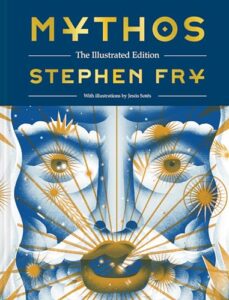This book really does have to be seen to be believed. The mammoth illustrated version of Stephen Fry’s first Mythos book is absolutely stunning, from its foiled covers and sprayed edges to its painted endpapers and gold bookmark ribbon. And that’s even before getting into Jesús Sotés’ evocative artwork, which reimagines the iconography of the Greek myths through a lens at once reminiscent of both early Christian religious art and proto-Cubism. It’s a wealth of visual material that perfectly complements the writing, rendering this volume a must-have for any collector of world mythology.
 I’d never actually read this book in any of its previous forms before landing this luxe iteration. I did have the pleasure of reading the second book in the series, Heroes, and spending far too much time musing over the ramifications of storytelling on the human psyche over the ages. Luckily for me, a lot of the toxic masculinity on display in Heroes is largely absent from this book, tho the insidious nature of patriarchal influence can scarcely be denied. To be clear, none of this sexism is at all Mr Fry’s fault! He recounts the old tales as best he can, in lively, modern language that rightly points out what absolute dicks these gods could be, as their structures of power rendered them largely unaccountable, regardless of gender. Speaking of which, it’s also of note how the ancient Greeks were far more progressive on certain ideas of gender and sexuality than some so-called liberals are today.
I’d never actually read this book in any of its previous forms before landing this luxe iteration. I did have the pleasure of reading the second book in the series, Heroes, and spending far too much time musing over the ramifications of storytelling on the human psyche over the ages. Luckily for me, a lot of the toxic masculinity on display in Heroes is largely absent from this book, tho the insidious nature of patriarchal influence can scarcely be denied. To be clear, none of this sexism is at all Mr Fry’s fault! He recounts the old tales as best he can, in lively, modern language that rightly points out what absolute dicks these gods could be, as their structures of power rendered them largely unaccountable, regardless of gender. Speaking of which, it’s also of note how the ancient Greeks were far more progressive on certain ideas of gender and sexuality than some so-called liberals are today.
It’s interesting to note, too, what other mores have changed. While fratricide is still considered one of the gravest sins, a parent killing a child in order to punish the other parent was once seen as an unfortunate but justifiable act. The traditional emphasis on xenia, the most gods-beloved spirit of hospitality, is also sobering given how selectively it’s practiced in the present day. I know it’s very intellectually indulgent of me to cherry pick which ancient beliefs should still be considered of higher importance — better to base my reasoning on thoughtful humanism than blind adherence to tradition, after all — but it’s the rare religion that doesn’t believe in feeding and sheltering the itinerant, and it pains me now to see how homelessness and poverty are treated even here in the United States of America, arguably the greatest nation in the world.
You’d think this was a digression, but really, what’s the point of mythology if not to be held up as a mirror to the world we have today? Myths and stories are some of the most useful ways to pass on knowledge, so that even if you don’t have experience of an ordeal, you’ll know how to avoid it (or court it, if you’re one of those types.)
Mr Fry understands this implicitly. He approaches the ancient Greek tales with an air at once fond but not slavish, with just the right amount of reverence for the enduring power of stories tempered by a skepticism of the ethos of conservatism, whereby all things should remain the same. Existence was born out of chaos, after all, with each cycle of change that followed creating more and almost inarguably better, according to the myths. This is all exemplified through the first three segments of the book: the two parts of The Beginning, and Part One of The Toys Of Zeus. The latter details how Zeus decided to create humanity, and how mortals in turn impacted the gods.
Interestingly, the tale of Dionysus, the only one of the Greek pantheon to be born of a mortal woman, is pushed into Part Two of The Toys Of Zeus, which further details how gods and men intermingled in some of the most powerful tales that remain known to us today. Mr Fry tried to stay true to the known timeline in making this choice — an unenviable task! — but I do feel that thematically the story of Dionysus would have been the perfect endcap to that section’s Part One.
But ugh, what do I know, I’m still spending way too much time mentally fact-checking the otherwise absorbing Netflix drama Kaos, which is far more loosely based on the Greek myths. Mr Fry’s scholarly yet accessible approach here shares the same sense of immediacy with the show but displays far more academic rigor — tho given that I’m only four episodes in, I suspect that there’ll be a huge twist that purposefully upends the entire known canon for the sake of show drama. Regardless, I’ve been highly entertained by both, even tho I will almost always be more partial to a smart book with beautiful illustrations and luxurious detailing — as this one is — than to any television show.
Mythos: The Illustrated Edition by Stephen Fry & Jesús Sotés was published September 3 2024 by Chronicle Books and is available from all good booksellers, including
